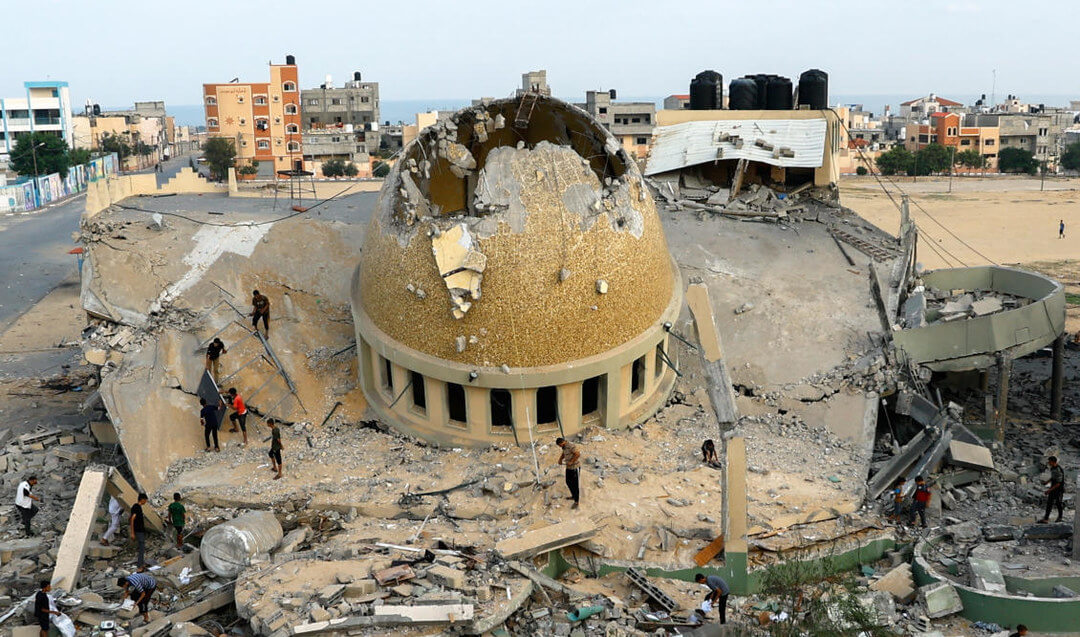The Palestinian militant group Hamas launched the biggest attack on Israel in years at 06:00 a.m. in the morning (Saturday, 7 October 2023); in a surprise assault that combined gunmen crossing into Israel with a barrage of rockets fired from the Gaza Strip, according to what we know so far.
How The Attack Unfolded
At about 6:30 a.m. local time, the Palestinian Islamist group Hamas fired a barrage of rockets across southern Israel, with sirens heard as far away as Tel Aviv and Beersheba.
Hamas claimed responsibility for firing 5,000 rockets in the first attack, while Israel’s military reported that 2,500 were fired.
The attack served as cover for an unprecedented multi-pronged infiltration of fighters, with the Israeli military announcing at 7:40 a.m. that Palestinian gunmen had crossed into Israel.

Most fighters crossed through breaches in the land security barriers that separated Gaza and Israel.
However, at least one fighter was captured on video crossing on a powered parachute, and a motorboat was filmed heading towards Zikim, an Israeli coastal town and military base.
Hamas released videos showing fighters breaching the security fences, with the dim light and low sun suggesting that it occurred at around the time of the rocket barrage.
Where the Attacks Took Place
At 10 a.m., Israel’s military reported that Palestinian fighters had breached at least three military installations along the frontier— the Erez border crossing, the Zikim base, and the Gaza division headquarters at Reim.
Fighters raided the Israeli border town of Sderot, and residents in another border community, Be’eri, as well as the town of Ofakim, located 30 km east of Gaza, reported their presence, according to Israeli media citing phone calls from residents.
Explosions were audible in cities around Tel Aviv and outside Jerusalem.
Residents were ordered by Israel’s military to take shelter inside, with a radio announcement stating, “We will reach you.”
By mid-morning, Israel’s police chief, Yaacov Shabtai, announced that forces were engaging gunmen in 21 locations, and at 1:30 p.m., the military confirmed that troops were still working to clear communities that had been overrun by gunmen.
An Israeli army spokesman confirmed that fighting was ongoing in 22 locations in southern Israel.
How Israel Responded
Prime Minister Benjamin Netanyahu declared that Israel was “at war” and issued a call for a mass mobilization of army reserves, stating, “We are at war. Not an ‘operation,’ not a ’round,’ but at war.”
In retaliation, the Israeli military initiated a series of airstrikes against targets belonging to Iran-backed Hamas in the blockaded coastal enclave, where black smoke billowed into the sky.
The Israeli Prime Minister’s office released a statement indicating that Israel would cease supplying electricity, fuel, and goods to Gaza.
Earlier in the day, Israel had ordered its state-run electricity company to halt the supply to the Gaza Strip.
The Latest Death Toll
Israel’s national rescue service reported that the attack had resulted in the deaths of at least 700 people, with hundreds more sustaining injuries.
Hamas’s attack on southern Israel became the deadliest one in Israel in years due to these casualties.
In retaliation, Israel’s response led to the deaths of at least 300 people in the Gaza Strip, with at least 1,700 others injured, as confirmed by the Palestinian Health Ministry in Gaza.
Why Hamas Launched Operation al-Aqsa Storm
The leader of Hamas’s military wing, Mohammed Deif, explained that the assault was a response to several factors, including the 16-year blockade of Gaza, Israeli raids within West Bank cities over the past year, violence at al-Aqsa, and increasing attacks by settlers on Palestinians, as well as the growth of settlements.
In a recorded message, Mr. Deif, who does not appear in public, stated, “Enough is enough.” He announced that the morning attack marked the beginning of Operation al-Aqsa Storm and called upon Palestinians from East Jerusalem to northern Israel to join the fight, emphasizing that “Today the people are regaining their revolution.”
The disputed al-Aqsa Mosque compound, situated at the heart of Jerusalem’s Old City, holds significance as the third holiest site in Islam and is sacred to Jews as the Temple Mount. This compound has been a frequent site of clashes between Israeli police and Palestinians in recent years.
How the World Responded
Leaders from around the world expressed their reactions to the attack.
Australian Foreign Affairs Minister Penny Wong wrote on social media, “We call for these attacks to stop and recognize Israel’s right to defend itself.” She urged restraint and the protection of civilian lives.
UN Middle East peace envoy Tor Wennesland stated, “This is a dangerous precipice, and I appeal to all to pull back from the brink.”
US Defence Secretary Lloyd Austin pledged, “Over the coming days, the Department of Defence will work to ensure that Israel has what it needs to defend itself and protect civilians from indiscriminate violence and terrorism.”
An adviser to Iran’s Supreme Leader Ali Khamenei, Yahya Rahim Safavi, congratulated Palestinian fighters, as reported by the semi-official ISNA news site, saying, “We will stand by the Palestinian fighters until the liberation of Palestine and Jerusalem.”
Russian foreign ministry spokesperson Maria Zakharova called on both the Palestinian and Israeli sides to implement an immediate ceasefire, renounce violence, exercise necessary restraint, and establish a negotiation process with the assistance of the international community to achieve comprehensive, lasting, and long-awaited peace in the Middle East.
Russian foreign ministry spokesperson Maria Zakharova called on both the Palestinian and Israeli sides to implement an immediate ceasefire, renounce violence, exercise necessary restraint, and establish a negotiation process with the assistance of the international community to achieve comprehensive, lasting, and long-awaited peace in the Middle East.
For Live Updates: Click Here
